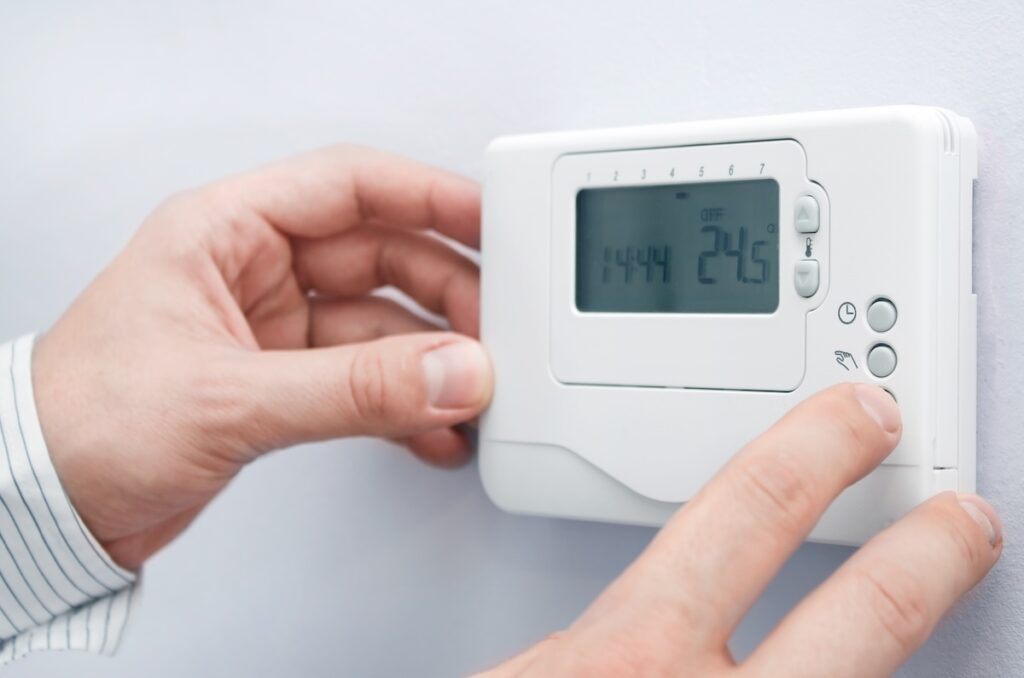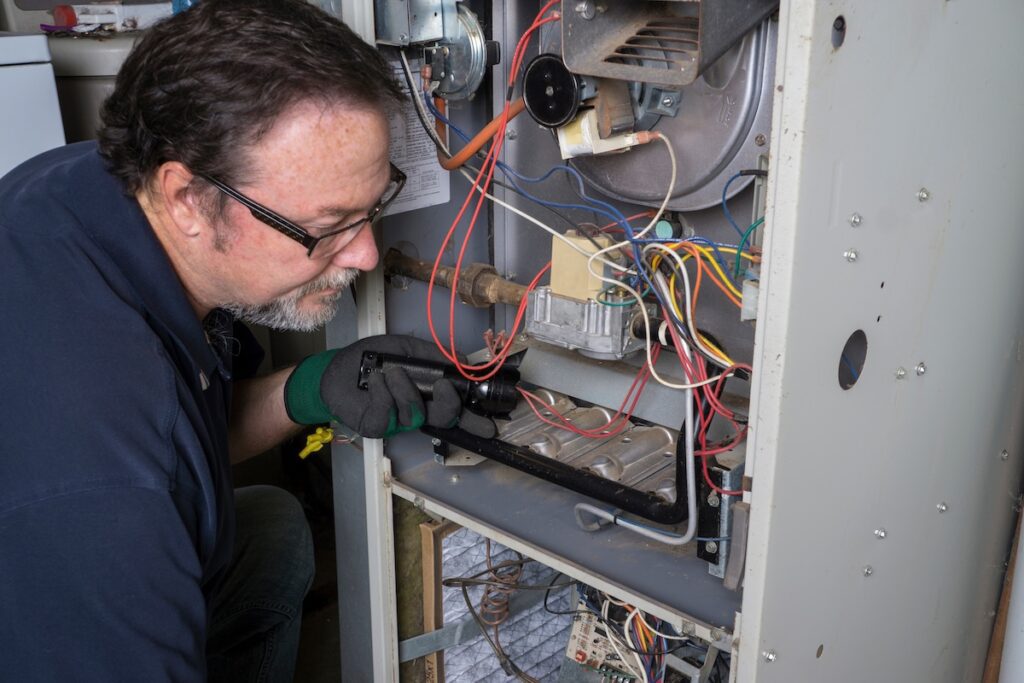Deciding on the best heating system for your home can feel overwhelming. Should you go with an electric furnace, or should you stick to gas? Both options come with their own set of advantages and considerations, so knowing the key differences will help you make the right choice. This guide will break down:
- The importance of understanding heating systems
- Key differences between electric furnaces vs gas furnaces
- How to decide which furnace is right for your home
🔎 Exploring the Basics of Electric and Gas Furnaces

Before you make a decision, let’s take a closer look at what makes electric furnaces and gas furnaces unique and how they operate.
Understanding Electric Furnaces
Electric furnaces work by drawing in electric energy to produce heat. The electricity powers heating elements, such as coils, which then warm the air. A blower fan circulates the heated air throughout your home via your ductwork.
- Uses electricity to generate heat.
- Powered by heating elements like coils.
- Distributes heated air through a blower fan and ductwork.
Understanding Gas Furnaces
Gas furnaces, on the other hand, rely on natural gas or propane to create heat. A burner ignites the fuel, generating hot air that is circulated through your home similarly to an electric furnace.
- Uses natural gas or propane as fuel.
- A burner ignites the fuel to create heat.
- Hot air is distributed through a similar blower fan and ductwork system.
⚖️ 6 Key Differences Between Electric and Gas Furnaces
Below, we’ve outlined the primary factors to consider when deciding between an electric or gas furnace.
1. Energy Source
An electric furnace operates entirely on electricity, making it an ideal choice for homes that are not connected to a natural gas network. This flexibility allows homeowners in rural areas or regions without widespread gas infrastructure to still enjoy a reliable heating solution. Since electric furnaces do not rely on fossil fuels, they are often considered a cleaner energy source, particularly in areas where electricity is generated from renewable resources like wind, solar, or hydroelectric power. However, in regions where electricity is produced predominantly from coal or natural gas, the environmental advantage of electric furnaces may be reduced. Gas furnaces, in contrast, are powered by natural gas or propane, which are fossil fuels. These fuels tend to be more cost-effective in areas where natural gas is abundant and affordable, such as urban centers with well-established gas infrastructure. Additionally, gas furnaces offer consistent and reliable heating, making them a popular option for homes located in colder climates where natural gas delivery is accessible and affordable.
2. Efficiency
Electric furnaces are renowned for their high energy efficiency because nearly all the electricity they consume is converted directly into heat, with very little energy loss. This makes them ideal for homeowners who value energy conservation and want to maximize the output of their heating system. However, the efficiency advantage comes with a trade-off: electricity prices are often higher and more variable than natural gas prices, which can result in higher operating costs over time. This is especially true in regions where electricity rates are already elevated. Gas furnaces, while not as efficient due to some energy loss in the form of exhaust gases, are generally more cost-effective to operate. The lower cost of natural gas typically offsets the slightly reduced efficiency, making gas furnaces a budget-friendly option for long-term use. Moreover, advancements in technology have led to the development of high-efficiency gas furnaces, which minimize energy waste and make them competitive with electric models in terms of performance.
3. Initial Costs
Electric furnaces are often more affordable upfront because their design is simpler and they do not require additional components like venting systems or gas lines. The installation process for electric furnaces is also more straightforward, which further reduces overall costs. These factors make electric furnaces an attractive choice for homeowners on a tight budget or those looking for a quick and easy installation process. However, it’s important to consider that the lower upfront cost might be offset by higher operating expenses over time due to electricity costs. Gas furnaces, on the other hand, tend to have a higher initial cost because of the need for specialized equipment such as combustion chambers, heat exchangers, and exhaust systems. Additionally, gas line hookups and venting systems must meet safety standards, which can further increase installation expenses. While this higher upfront investment may seem daunting, the long-term savings from lower heating costs can make gas furnaces a worthwhile option for many homeowners.
4. Durability and Maintenance
Electric furnaces are known for their simple and durable construction, which allows them to last longer and require less frequent maintenance compared to gas systems. With fewer moving parts and no combustion process, electric furnaces are less prone to wear and tear, reducing the likelihood of breakdowns or costly repairs. Many electric furnaces can last between 20 and 30 years with minimal upkeep, making them a reliable long-term investment. Gas furnaces, while efficient in heating, involve more complex components such as burners, pilot lights, and heat exchangers, all of which require regular inspections and maintenance to ensure safe and efficient operation. Gas furnaces are also subject to issues like carbon monoxide leaks, which makes maintenance critical for safety reasons. The lifespan of a gas furnace is typically shorter, ranging from 15 to 20 years, due to the additional stress on its components caused by the combustion process.
5. Environmental Impact
One of the key advantages of electric furnaces is their lack of direct emissions. Since they do not burn fossil fuels, electric furnaces produce no exhaust gases, making them a cleaner option for homeowners looking to reduce their carbon footprint. However, the overall environmental impact of an electric furnace depends on how the electricity it uses is generated. In areas where electricity comes from renewable sources like solar, wind, or hydroelectric power, the environmental benefits of using an electric furnace are significant. Conversely, if the electricity is generated from coal or natural gas, the environmental advantage diminishes. Gas furnaces, on the other hand, emit carbon dioxide and other greenhouse gases during operation, contributing to air pollution and climate change. This makes gas furnaces a less eco-friendly option, particularly in regions that are prioritizing reductions in carbon emissions. That said, improvements in gas furnace efficiency and the use of cleaner-burning fuels like propane can help mitigate some of the environmental drawbacks.
6. Heat Output
Electric furnaces generate heat through electrical resistance, which makes them slower to heat up compared to gas systems. This gradual heat production is suitable for milder climates where extreme cold is not a common concern. However, in regions with harsh winters, the slower heating capacity of an electric furnace may struggle to maintain comfortable indoor temperatures, especially during prolonged cold spells. Gas furnaces, by contrast, are designed for rapid and powerful heat output. They can quickly warm up a space, making them an excellent choice for homes in colder climates or areas that experience frequent temperature drops. The ability of gas furnaces to produce higher levels of heat more efficiently makes them the preferred option for homeowners who need consistent and reliable heating in winter. Additionally, the robust heat output of gas furnaces provides better comfort during extremely cold conditions, ensuring that homes remain warm and cozy regardless of the weather outside.
👉 How to Decide Which Furnace Is Right for You

When determining whether an electric or gas furnace is the right choice, keep these factors in mind:
Your Local Climate
The climate in your area plays a big role in determining the right furnace for your home. If you live in a colder region with harsh winters, a gas furnace may be the better option as it typically provides more powerful and consistent heating. On the other hand, if you live in a milder climate with less extreme temperature drops, an electric furnace can easily meet your heating needs without requiring the extra power of gas.
Access to Energy Sources
Do you have access to a natural gas line where you live? If your home isn’t connected to one, installing a gas furnace may not be practical. In this case, an electric furnace would be a more convenient and viable choice. Electric furnaces don’t rely on gas lines and can be installed almost anywhere, making them a more flexible option for homes without natural gas access.
Energy Costs in Your Area
Energy costs vary greatly depending on where you live, so it’s important to research the prices of electricity and natural gas in your area. If electricity is more affordable than natural gas where you live, an electric furnace could help you save on utility bills. However, if natural gas is less expensive, a gas furnace may be a more economical option in the long run.
Upfront Costs and Budget
When choosing between a gas or electric furnace, budget is an important factor to consider. Electric furnaces typically have lower upfront installation costs, making them a more budget-friendly choice for homeowners who want to minimize initial expenses. Gas furnaces, while more powerful, often come with higher installation costs, so it’s important to weigh the long-term savings against the upfront investment.
Your Carbon Footprint
If reducing your environmental impact is a priority, the carbon footprint of your furnace should be taken into account. Electric furnaces are generally more environmentally friendly since they don’t produce carbon emissions during operation. If your electricity comes from renewable energy sources, the environmental benefits are even greater. Gas furnaces, while efficient, rely on fossil fuels and produce emissions, which may not align with sustainability goals.
🏠 Furnace Comparison
When it comes to choosing between an electric or gas furnace, making the right decision can feel overwhelming. That’s where our team at Palmetto Air Conditioning comes in. With over 20 years of experience serving Lexington, SC, and surrounding areas, we pride ourselves on delivering personalized solutions that fit your home, budget, and lifestyle.
From expert guidance to professional installations, we’re here to ensure your heating system keeps your family comfortable, no matter the season. Ready to get started? Contact Palmetto Air Conditioning today for a free consultation or estimate, and let us help you find the perfect furnace for your home!
